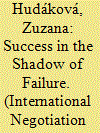|
|
|
Sort Order |
|
|
|
Items / Page
|
|
|
|
|
|
|
| Srl | Item |
| 1 |
ID:
185681


|
|
|
|
|
| Summary/Abstract |
While sanctions and mediation are often used to address the same conflict situations, they are usually employed without significant coordination. Focusing on a rare case of a mediator successfully wielding the threat of sanctions, this article explores the utility of sanctions for mediation in the Yemeni political transition during the mandate of UN special adviser Jamal Benomar. Although the transition ultimately derailed, the analysis shows that the threat of sanctions can be used in different phases of the mediation process to provide mediators with the leverage needed to convince conflict parties to engage in negotiations, break stalemates during talks, nudge parties toward an agreement, or persuade potential spoilers to refrain from undermining the implementation of the negotiated agreement. Their success, however, not only depends on the degree of convergence between the application of the two instruments, but also on the type of target, regional support, and institutional backing.
|
|
|
|
|
|
|
|
|
|
|
|
|
|
|
|
| 2 |
ID:
183955


|
|
|
|
|
| Summary/Abstract |
Over the past few years, Yemen has become synonymous with mediation failure. This contrasts sharply with the situation in the early 2010s, when the United Nations played a crucial role in persuading Yemen’s long-serving President, Ali Abdullah Saleh, to step down from power and, at least initially, successfully steered the country during the ensuing political transition. By analyzing UN mediation efforts during the mandate of Special Adviser Jamal Benomar, the article draws attention to the multiple shifting benchmarks for success. It adopts a phase-differentiated approach to mediation evaluation, which not only allows for recognition of earlier successes, but also enables an analysis of relevant factors influencing mediation success or failure in different stages of the mediation process. In the final instance, the analysis suggests that the eventual failure of UN mediation in Yemen can be traced to conflict and contextual factors rather than the mediator or the mediation process.
|
|
|
|
|
|
|
|
|
|
|
|
|
|
|
|
|
|
|
|
|